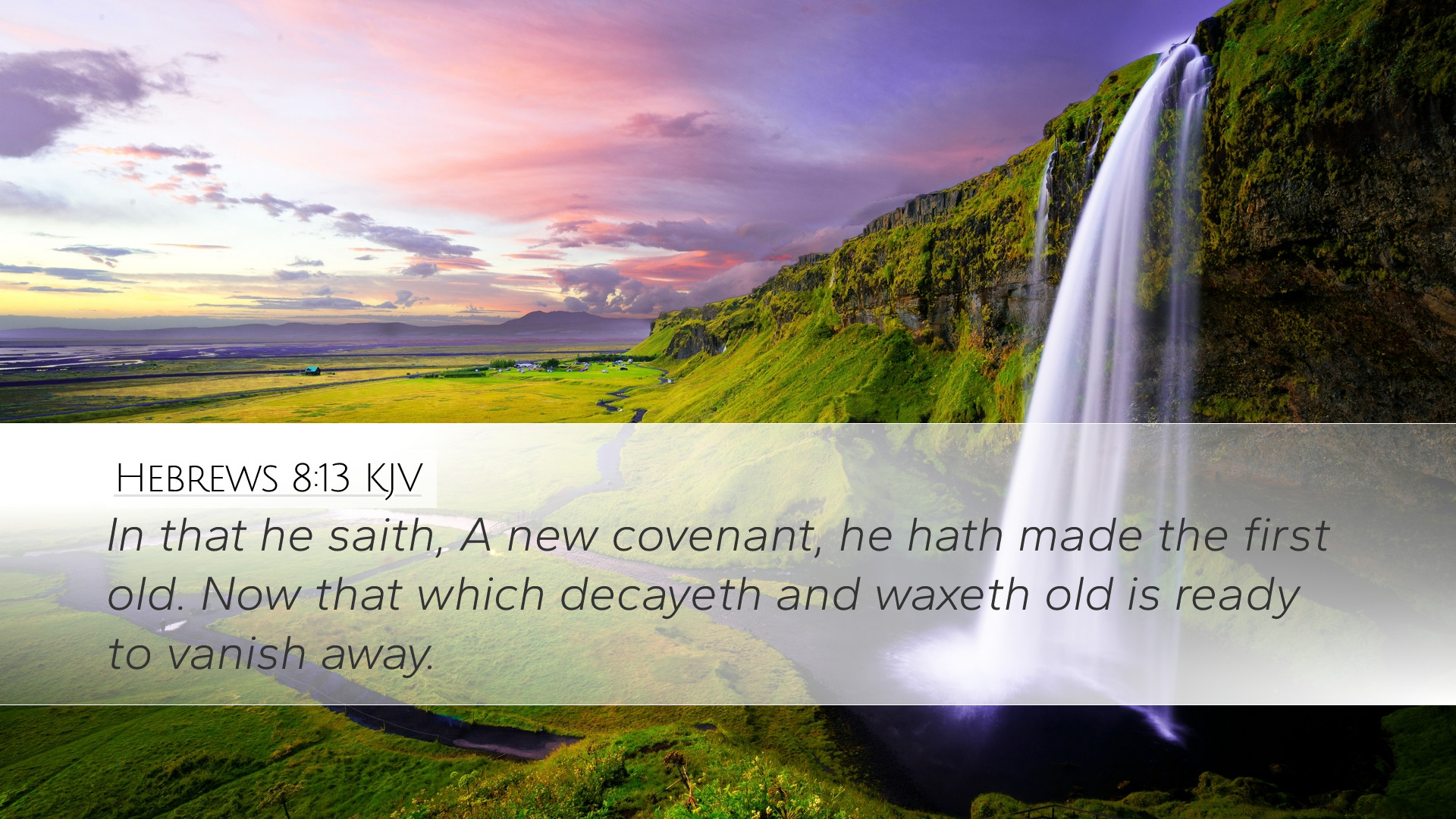Old Testament
Genesis Exodus Leviticus Numbers Deuteronomy Joshua Judges Ruth 1 Samuel 2 Samuel 1 Kings 2 Kings 1 Chronicles 2 Chronicles Ezra Nehemiah Esther Job Psalms Proverbs Ecclesiastes Song of Solomon Isaiah Jeremiah Lamentations Ezekiel Daniel Hosea Joel Amos Obadiah Jonah Micah Nahum Habakkuk Zephaniah Haggai Zechariah MalachiHebrews 8:13
Hebrews 8:13 KJV
In that he saith, A new covenant, he hath made the first old. Now that which decayeth and waxeth old is ready to vanish away.
Hebrews 8:13 Bible Commentary
Commentary on Hebrews 8:13
Hebrews 8:13 states, "In that he saith, A new covenant, he hath made the first old. Now that which decayeth and waxeth old is ready to vanish away." This verse encapsulates a significant transition in the redemptive plan of God. The Epistle to the Hebrews emphasizes the contrast between the Old Covenant, which was established under the Mosaic law, and the New Covenant, inaugurated by Christ.
Overview of the Covenant Transition
The author of Hebrews is arguing for the superiority of the New Covenant over the Old. This assertion is critical as it establishes the foundation for understanding the role of Jesus as mediator and high priest. The phrase "a new covenant" signifies a radical shift.
Insights from Matthew Henry
Matthew Henry illuminates the nature of the New Covenant. He articulates that the New Covenant is characterized by its internal nature; it places God's laws within the heart rather than merely external statutes. The Old Covenant, while holy, was insufficient for true righteousness as it relied on human ability to fulfill its demands.
- Internal Transformation: Henry asserts that the New Covenant brings about an internal transformation, enabling believers to live according to God’s will.
- God’s Assurance: This covenant illustrates God’s commitment to His people, fulfilling His promise to write His laws in their minds and hearts.
Insights from Albert Barnes
Albert Barnes adds depth by emphasizing the permanence of the New Covenant. He notes that when God declares the Old Covenant as "ready to vanish away," it signifies the end of an era of reliance on the law and the establishment of grace. This transition also involves the concept of obsolescence, highlighting that the ceremonies and sacrifices of the Old Covenant are now redundant in light of Christ's atoning work.
- Obsolescence of the Old Covenant: Barnes explains that elements of the Old Covenant have faded as they were shadows of the reality found in Christ.
- Christ’s Fulfillment: He posits that Jesus fulfilled the law, thereby rendering the Old Covenant obsolete, as indicated by its impending disappearance.
Insights from Adam Clarke
Adam Clarke elaborates on the implications of the New Covenant, particularly its scope and accessibility. Clarke emphasizes that the New Covenant offers a direct relationship with God through the Spirit, a privilege not available under the Old Covenant.
- Direct Access to God: Clarke highlights how believers are invited directly into fellowship with God, an invitation not fully realized under the Old Covenant.
- Universal Availability: According to Clarke, the New Covenant extends beyond ethnic and cultural boundaries, fulfilling God’s intention to bless all nations through Abraham.
Theological Implications
The declaration that the Old Covenant is "ready to vanish away" carries profound theological implications. It underscores the finality of Christ's work and the nature of God's revelations. Believers are encouraged to rely on the promises of the New Covenant, which provide assurance of salvation and reconciliation with God.
- Empowerment by the Spirit: The New Covenant is established through the empowerment by the Holy Spirit, enabling believers to live according to God’s commandments.
- Security in Christ: The assurance of a new and eternal covenant reinforces the believer's security in Christ, eliminating fears of falling back under the condemnation of the law.
Conclusion
Hebrews 8:13 serves as a stunning reminder of God’s redemptive work through Christ. Through the insights of Matthew Henry, Albert Barnes, and Adam Clarke, we grasp that the New Covenant not only supersedes the Old but also fulfills the promises of God in a manner that fosters personal transformation and direct communion with Him. This rich theological tapestry beckons pastors, students, and scholars alike to appreciate the depth and breadth of God's covenantal relationship with His people.


